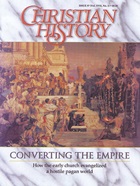American Christianity has depended on great evangelists with great methods to both get and keep the evangelistic enterprise going.
Billy Graham's crusades are less remarkable for the number of people he converts than for the number of local Christians he involves in the evangelistic task—they pray for conversions, invite friends to the stadium, counsel people down on the field, and so on.
We see a similar phenomenon in his predecessors: George Whitefield, Charles Finney, Dwight Moody, and Billy Sunday. In doing great evangelism for great crowds, these great men motivated the ordinary to spread the faith. This phenomenon is central to the story of American Christianity.
The early church knew no such phenomenon. It didn't have a Graham, a Finney, or a Moody. It didn't have Promise Keepers. It didn't have a Great Awakening or user-friendly churches. Furthermore, it had no concise spiritual laws to share, no explosive method for talking to the unconverted.
What it had seems paltry: unspectacular people, with a hodgepodge of methods (so hodgepodge they can hardly be called "methods"), and rarely a gathering of more than a handful of people.
The paltry seems to have been enough, however, to make an emperor or two stop and take notice.
One of those emperors was Constantine, who, when he converted, changed entirely the dynamics of early church growth. So though we bring up his story, and that of his successors (to reveal the larger context), we focus on evangelism before Constantine.
The issue, then, has no central character or unifying narrative. It is a jumble of articles about a hodgepodge of things that normal and (to us) nameless Christians did to bring the name of Jesus Christ to the attention of pagans.
Not a phenomenon that filled stadiums, just enough to begin converting the known world.
P.S. Our online pages (http://www.christianhistory.net or AOL Keyword: CH) are getting a new look with new features. Check them out.
Copyright © 1998 by the author or Christianity Today/Christian History magazine.
Click here for reprint information on Christian History.

Support Our Work
Subscribe to CT for less than $4.25/month





























